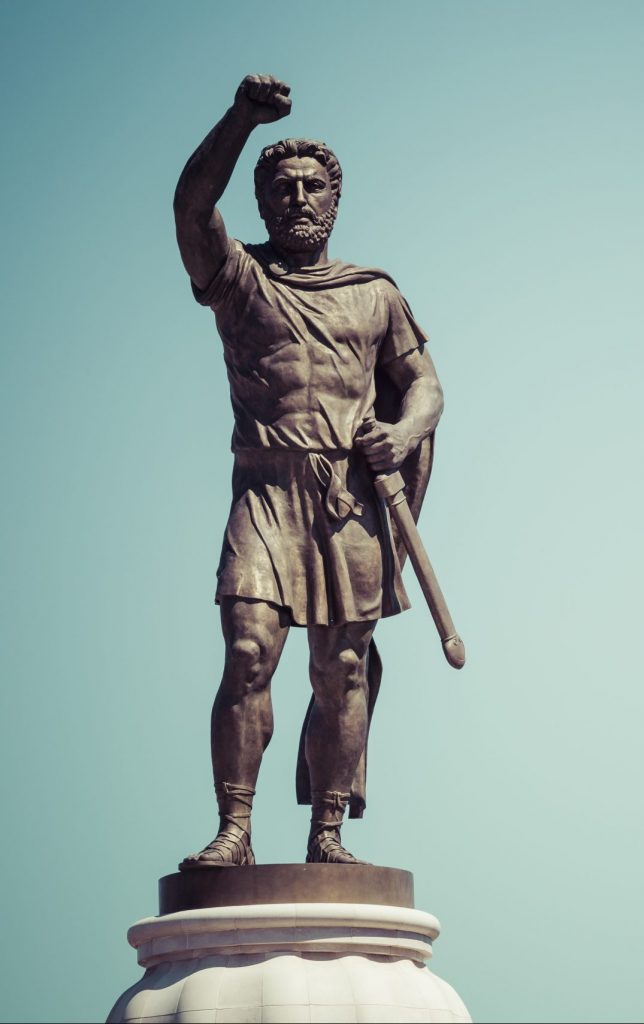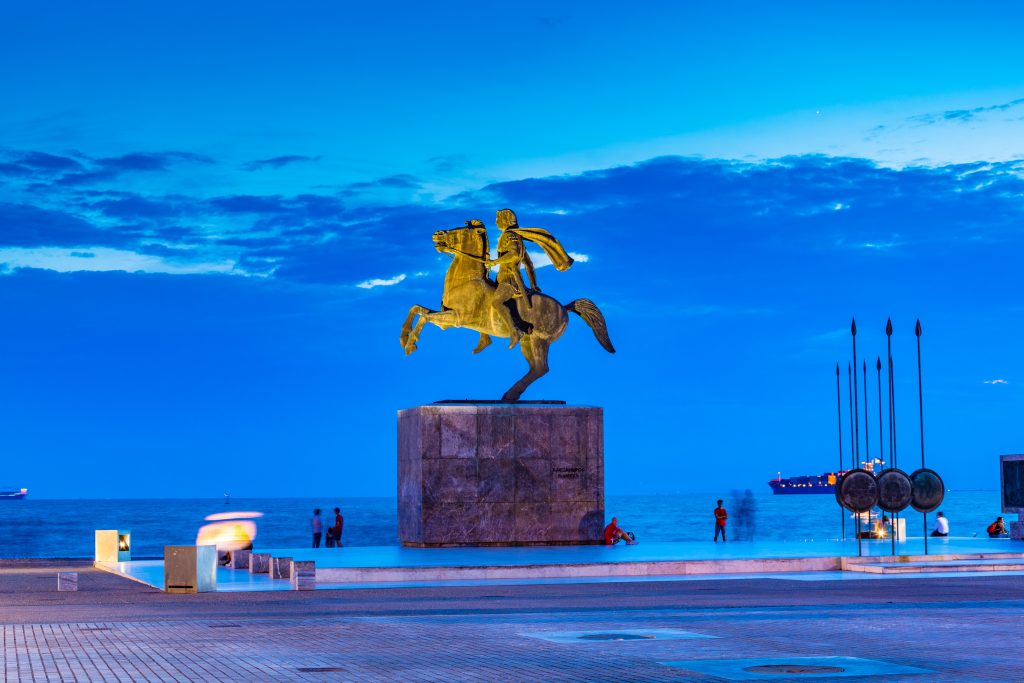“There is nothing impossible to him who will try.”
Alexander the Great
Alexander the Great Early Life

Alexander the Great was an exceptional world leader. He left his print on the face of human history at a very young age and for a very short time, a little more than ten years. His lifetime spanned over 33 years, but that period was enough for Alexander to accomplish his ambitions, starting at the age of nineteen or twenty years old. Today a twenty years old is considered just a boy, and so was considered Alexander. He proved that he was not just a boy, succeeding in creating the biggest known empire in the world at the time.
Alexander the Great was born in the fourth century BCE, in the year 356, in Pella, a region in Macedonia located in the northwest of Thessaloniki, today Greece. His death date is believed to have been Jun 13, 323 BCE. His father was Philip II, king of Macedonia, a region in the north of Greece during that time, while his mother was Olympias of royal descent (the daughter of King Neoptolemus of Epirus). There were legends concerning Alexander’s birth and childhood. His biographer Plutarch says that Olympia, on the eve of consummation of her marriage to Philip, dreamed that her womb was struck by a thunderbolt, causing a flame to spread far and wide until it died away. Even King Philip is reported to have dreamed of sealing his wife’s womb with a seal engraved with a lion’s image. The legend said that Alexander’s birth father was Zeus himself, the ruler of Greek gods, making Alexander a demi-god. His mother Olympia was the one who motivated and inspired her son to believe that he was a descendent of heroes and gods.
Everything he accomplished could never discourage this belief. Alexander spent the early years of his life watching his father Philip II while he was turning Macedonia into a great military power. King Phillip II was a great military man who won victory after victory throughout the Balkans. Alexander too proved he was going to be a great man with impressive qualities. Only at the age of 12, Alexander managed to tame Bucephalus, a wild stallion that no one could. Alexander spoke soothingly and turned the horse away from the sun in order not to see the shadow that seemed to distress it; in this way, Alexander managed to tame the horse. The historian named Plutarch writes: “Philip and his friends looked at first in silence and anxiety for the result, till seeing him turn at the end of his career, and come back rejoicing and triumphing for what he had performed, they all burst out into acclamations of applause, and his father shedding tears of joy, kissed him as he came down from his horse, and in his transport said, ‘O my son, look thee out a kingdom equal to and worthy to thyself, for Macedonia is too little for thee.’ “So, this horse became Alexander’s companion in all his major battles, till the end.
His Education And Preparation For His Military Campaigns.
During his childhood, Alexander was educated under the tutelage of one of his relatives, the stern Leonidas of Epirus. King Phillip hired him to teach his son mathematics, how to ride the horse, and archery, Leonidas himself struggled to handle his rebellious student. Under his tutelage, Alexander had to endure hardships such as forced marches. The next tutor of Alexander was Lysimachus, who tried to capture this restless boy’s attention by roleplay. Alexander was delighted to impersonate the warrior Achilles. In 343 B.C, King Phillip II hired the great Greek philosopher Aristotle in the area of Naoussa to be the tutor of his son and heir. In the Temple of Nymphs near Naoussa, Aristotle taught Alexander, who was at the age of 13 at that time, and a group of his friends philosophy, poetry, drama, science, religion, and politics. Under the tutelage of Aristotle, Alexander developed a passion for Homer’s work. The heroes of the Iliad inspired him to become a mighty warrior, later Aristotle gave him a copy of it which Alexander carried on his military campaigns.
He became a soldier at a very young age; at just 16, he had his first military expedition against Thracian tribes, which he won. A year later, he was in command of the Cavalry, coming in assistance to his father in defeating the Athenian and Theban armies at Chaeronea. King Philip II proved he could unite the Greek states under the Corinthian League. King Philip II was an extraordinary individual who had defeated Macedonian enemies around its borders in less than ten years. The Illyrians and the Paionians to the west and northwest, and the Thracians to the north and northeast. King Philip II brought reforms at home and abroad. He improved the army and brought innovations in siege machinery and infantry. During the Battle of Chaeronea in Boetia, Phillip completed the last task, which made him the undisputed ruler of Greece. In the year 336 B.C., King Phillip was assassinated by his bodyguard Pausanias, and while he was trying to escape, he was pursued and killed. Immediately, Alexander was proclaimed king among the nobility and the army at the age of 20. It was his father, King Phillip II, who prepared a great army with the latest innovations, and who managed to join the Greek city-states polis under the Macedonian leadership. Before that, the Greeks were divided between themselves, and King Philip brought unity to Greece. So King Philip II prepared everything his heir would need to start his military campaign against Persia.
Alexander And His Military Campaigns
Alexander inherited his kingdom with its wealth, resources, and problems as well. Alexander first had to get rid of the pretenders to his throne, his neighboring enemy countries, the Thracians and Illyrians, and quell the revolt that had taken place in Greece before he started his conquest of Persia. In one of his military campaigns, Alexander headed to Gordium, a place well known for the Gordian knot’s story. The legend said that whoever was able to unwind this knot would conquer all Asia. Alexander tried with his hands first, but it was impossible, then he sliced it with his sword, thus claiming victory.
During his campaign against Persia, he defeated the king of Persia Darius in two battles where he had to flee and abandon his family in the hands of Alexander. Leonnatus, one of Alexander’s officers, told them on behalf of Alexander that Darius is alive, and he managed to escape safely. He assured them they should not be injured, not just that but nothing had to change in their mode of life; they had to be treated like queens.
Alexander was kind and merciful toward Sysigambis, the mother of Darius and the rest of his family. They believed Alexander was going to put them to death, but they never expected such clemency. Indeed, he didn’t give them liberty, but in every other respect, he treated them with the greatest kindness and consideration. He called Sysigambis’s mother and gave her presents which he had taken from the spoils. Alexander expressed that he felt no animosity or bad intentions toward Darius; he was just his enemy engaged in winning the contest of Asia. After hearing this, Darius’s family regained themselves.
After having defeated King Darius for the first time, Alexander campaigned to Egypt, where they immediately accepted him as king and crowned him Pharaoh. In Egypt, Alexander founded the city of Alexandria bearing his name. The city became an important center of learning and Greek culture. Later he invaded Mesopotamia, where he had to face Darius one more time and defeated him again. He advanced further inland into Persia, gaining the royal treasure that had been accumulated for two centuries. During the journey to Ecbatana, Alexander faced Darius for the last time, but this time Darius was murdered by his men. When Alexander saw the dead body of Darius, he was shocked and overwhelmed with grief. He spread his military cloak over the dead body. He immediately ordered arrangements for having the body embalmed and then sent it to Susa, to Sysigambis, the mother of Darius, in a very costly coffin for the royal funeral procession. He did this so that Darius’ mother could bury her son in the tombs of Persian kings.
His Campaign To India
Alexander wanted to push his conquest furthermore to the edge of the known world; his campaigns were headed eastward to Central Asia. He seized many other vast territories and consolidated his power by removing people who proved they weren’t loyal to him and replacing them with his loyal friends. Alexander headed to Punjab, India. Some of the Indian tribes surrendered themselves peacefully, while others resisted but lost. In the year 327 B.C., Alexander had a battle with the King Porus at the Hydespas River. For the first time, the Greek army saw elephants used in battle. Even so, Porus lost the battle. Alexander was eager to conquer all of India, but his troops were homesick, and for the first time, they refused to go any further. He tried to convince his soldiers, but one of the generals, Coenus pleaded with him to change his mind and return; he said that the soldier longed to see their parents, wives, and children, their homeland again.” Alexander agreed and headed south along the Indus. He had a battle at Malhi (modern-day Multan) during the war where Alexander had a serious injury during the siege. He reached Susa in 324 BC but lost too many men due to the harsh desert.
His Last Days In Persia, His Death And Legacy
During the last years in Persia, Alexander had to put things right while his governors had misbehaved in his absence, which several of them were executed on his way to Susa. Alexander the Great was concerned to rule his empire; due to the need for soldiers, officers, and administrators, he attempted to bind in marriages Persian nobility to the Macedonians to form a ruling class. He ordered the marriages of 80 of his companions to marry Persian princesses, and he married Roxana and Stateira, Darius’ daughter. Through marriages, he wanted to legitimize his sovereignty. He incorporated Persian soldiers, an act not welcomed by his countrymen. He decided to dismiss his aged and wounded soldiers, an act which the Macedonian soldiers blamed upon the Persian new troops. Alexander tried to adopt Persian manners, another act that revolted his army against him because they despised the Persian and were proud of their Macedonian culture. He then mentioned to his army and movingly reminded them of their glories and honors. After three days, the Macedonians repented, and in a thanksgiving feast Persians joined the Macedonians as forces of Alexander — but not as brothers.

In the spring of 323, Alexander moved to Babylon, making plans to explore and conquer the Caspian Sea, Arabia, and northern Africa. But on Jun 2, he fell ill with malaria, and after 11 days at the age of 32, he died. It is reported Alexander had said before his death: “When my casket is being carried to the grave, leave my hands hanging outside. For empty-handed, I came into this world, and empty-handed, I shall go! My whole life has been a hollow waste, a futile exercise, for no one at death can take anything with them!” People who loved him mourned his death, while his enemies rejoiced. Before I have mentioned Sysigambis, the mother of the king of Persia, Darius. Anyone would expect her to rejoice about Alexander’s death, but she was among the ones who mourned. Alexander always called her mother, supplied with all her wants, and took care of her protection, comfort, and happiness. With the loss of Alexander, she lost her earthly protector. Many historians see Alexander from a different viewpoint. He was intelligent and handsome, but like every human being, he had a dark side. He had a ferocious temper, and there were times that he murdered his close advisers and even friends. Over time and as many more campaigns he fought, he became gradually more and more ruthless.
It is worth mentioning that Alexander’s legacy surpassed the limits of military conquests. Thanks to his campaign, the contact between East and West was increased considerably, presenting the Greek civilization to conquered land. He established many cities that later became cultural centers, e.g., the city of Alexandria in Egypt that still exists today and is very important in Egypt. He took record of the areas where he marched, giving the Greeks a sense of being part of a world beyond the Mediterranean. Alexander’s empire was the greatest empire known at that time. It stretches from the Balkan to Egypt and at the borders of India.
In the year 327 B.C., His empire covered some 5, 200,000 sq km (2,000,000 sq mi). After his death, the empire remained under the Greek influence for 200-300 years, a time known as the Hellenistic period. He founded almost twenty cities bearing his name and temples dedicated to Greek gods Athena and Zeus. Alexander was an example of inspiration for the succeeding world leaders, especially the Roman generals, who wanted to associate themselves with his achievements and saw him as a role model, starting with Pompey the Great, Julius Caesar, Octavian August, and many others.
References :
- Alexander the Great quoted in goodreads n.d. https://www.goodreads.com/author/quotes/4921445.Alexander_the_Great. The quote at the top
- Alexander the Great. Ancient Greece. Ancient Civilizations. n.d, https://www.ushistory.org/civ/5g.asp
- Alexander the Great. History. Originally: Nov 9, 2009. Updated: Nov 24, 2020. https://www.history.com/topics/ancient-history/alexander-the-great
- Alexander the Great. History of Macedonia blog. N.d, http://www.historyofmacedonia.org/AncientMacedonia/AlexandertheGreat.html
- Alexander the Great. From Wikipedia, the free encyclopedia, https://en.wikipedia.org/wiki/Alexander_the_Great#Lineage_and_childhood
- Alexander the Great. YOUR DICTIONARY. n.d., https://biography.yourdictionary.com/alexander-the-great
- Authors com Editors. Alexander the Great Biography. The biography.com website. Publisher A&E Television Networks. Originally publshed date Apr 2, 2014. Last updated Jul 9, 2020.. Access Date Feb 21. https://www.biography.com/political-figure/alexander-the-great
- Hemingway, Colette. October 2004. The Rise of Macedon. THE MET. https://www.metmuseum.org/toah/hd/alex/hd_alex.htm
- Horse, Bucephalus – Black Stallion Winery. https://www.blackstallionwinery.com/assets/client/File/The%20Story%20of%20Bucephalus_poster.pdf
- Jacob Abbott. Alexander the Great. NEW YORK AND LONDON. HARPE & BROTPUBLISHERS. Pg 141. Pg 270. http://www.gutenberg.org/files/30624/30624-h/30624-h.htm#Chapte
- Jarus, Owen. Alexander the Great: Facts, Biography & Accomplishments. LIVESCIENCE. Aug 31, 2017. https://www.livescience.com/39997-alexander-the-great.html
- Mark, Joshua J. Nov 14, Alexander the Great. WORLD HISTORY ENCYCLOPEDIA. https://www.ancient.eu/Alexander_the_Great/
- The Great philosopher Aristotles taught Alexander the Great in Naoussa. Apr 14. https://trigiro.com/great-philosopher-aristoteles-taught-alexander-great-naoussa/
- The Military Campagns of Alexander the Great. Updated Feb 24, 2021. ENCYCLOPEDIA.COM. https://www.encyclopedia.com/history/news-wires-white-papers-and-books/military-campaigns-alexander-great
- Walbank, Frank W. Alexander the Great. n.d. Britannica. https://www.britannica.com/biography/Alexander-the-Great























